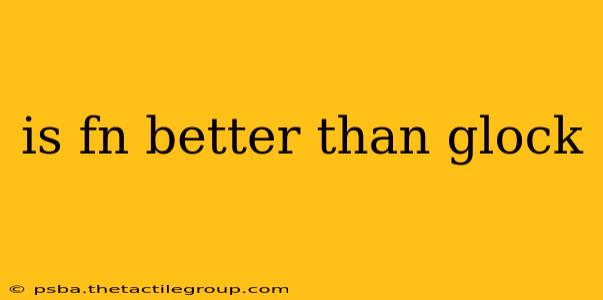The age-old question for handgun enthusiasts: FN or Glock? Both manufacturers produce highly reliable and popular firearms, but choosing between them requires a nuanced understanding of their respective strengths and weaknesses. This in-depth comparison will explore key features, performance characteristics, and user preferences to help you decide which pistol best suits your needs.
Key Differences: FN and Glock Handguns
While both FN and Glock produce pistols chambered in various calibers, key differences lie in their designs, ergonomics, and overall feel.
Frame Material and Construction:
- Glock: Primarily utilizes polymer frames, known for their lightweight and durable nature. This contributes to the pistol's ease of handling and concealability.
- FN: Offers a wider range of frame materials, including polymer and steel. Steel frames, often found in their higher-end models, provide enhanced durability and a more substantial feel. However, they are heavier than polymer counterparts.
Ergonomics and Grip:
- Glock: Known for its aggressive, textured grip, designed for a secure hold, even in wet conditions. However, this aggressive texture might be uncomfortable for some users. The grip angle is also a point of discussion, with some finding it less ergonomic than others.
- FN: Offers more refined ergonomics, with a generally more comfortable grip angle and texture for a wider range of hand sizes. They often incorporate features designed to enhance control and reduce recoil.
Trigger Mechanisms:
- Glock: Uses a Safe Action trigger system, which incorporates a trigger safety, firing pin safety, and drop safety. The trigger pull is often characterized as having a longer, slightly heavier pull.
- FN: Employs a variety of trigger systems depending on the specific model. Some feature a more traditional double-action/single-action (DA/SA) system, while others incorporate improved striker-fired mechanisms that often deliver a crisper, shorter trigger pull.
Reliability and Durability:
- Glock: Widely recognized for its legendary reliability, proven through extensive use by law enforcement and military personnel worldwide. Glocks are known for their ability to function flawlessly under harsh conditions.
- FN: FN pistols also boast a high level of reliability, built with precision engineering and quality materials. Their reputation for reliability is firmly established within the firearms community.
Customization Options:
- Glock: Boasts a massive aftermarket support system, with a vast array of aftermarket parts and accessories available. This allows for extensive customization to personalize the firearm to individual preferences.
- FN: While FN offers customization options, the aftermarket support is not as extensive as Glock's. However, many high-quality accessories are still available.
Which is "Better"? It Depends.
The "better" pistol depends entirely on individual preferences and intended use. There's no single right answer.
-
Choose Glock if: You prioritize affordability, extreme reliability, extensive customization options, and a lightweight, easily concealable pistol. The aggressive grip might be advantageous for users with larger hands.
-
Choose FN if: You prefer a more refined, ergonomic feel, potentially a heavier steel frame for enhanced stability, and a potentially crisper trigger pull. While often slightly more expensive, FN pistols offer a robust and reliable platform.
Beyond the Basics: Considering Specific Models
Both FN and Glock offer various models chambered in different calibers, each with its own unique features and specifications. Researching specific models within each manufacturer's lineup is crucial before making a decision. Consider factors such as caliber, barrel length, sight options, and intended use (home defense, concealed carry, competition, etc.).
Ultimately, the best way to determine which pistol is right for you is to handle both FN and Glock pistols, if possible, and test fire them (under proper supervision at a shooting range). This hands-on experience will allow you to assess the ergonomics, trigger feel, and overall suitability for your individual needs and preferences.

